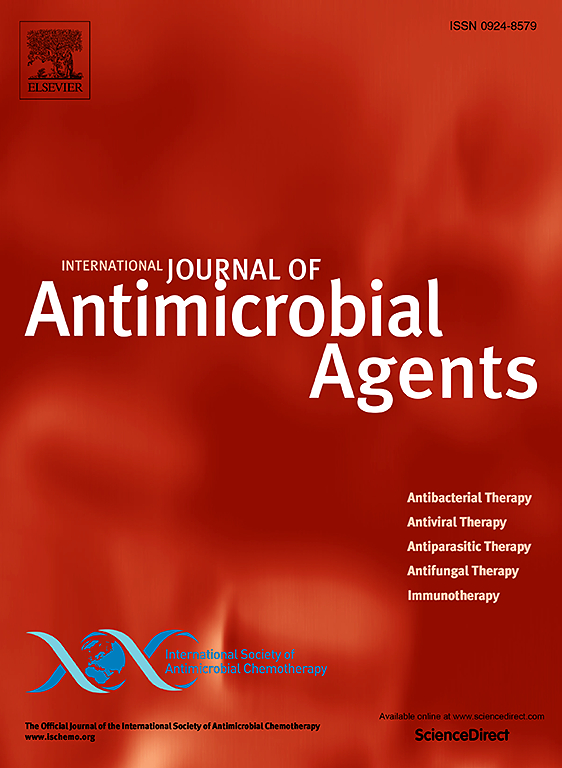响应调节蛋白 CiaR 调节肺炎链球菌的 ccn-microRNAs 转录和β-内酰胺类抗生素耐药性转换。
IF 4.9
2区 医学
Q1 INFECTIOUS DISEASES
International Journal of Antimicrobial Agents
Pub Date : 2025-01-01
DOI:10.1016/j.ijantimicag.2024.107387
引用次数: 0
摘要
导言:肺炎链球菌不产生 β-内酰胺酶,其对β-内酰胺类抗生素的敏感性降低主要是由青霉素结合蛋白(PBPs)突变引起的,但肺炎链球菌菌株中与 PBP 突变无关的 β-内酰胺类抗生素耐药性的机制仍然特征不清:方法:使用 E-test 检测肺炎球菌 ATCC49619 及其 ciaR 基因敲除、补充或过表达突变体(ΔciaR、CΔciaR 或 ciaROE)对青霉素、头孢他啶和亚胺培南的敏感性。肺炎球菌 ciaR-mRNA、五种 ccn-microRNA 和六种 pbps-mRNA 的水平通过 qRT-PCR 进行测定。重组 CiaR(rCiaR)与 ccn-microRNA 基因启动子的结合通过电泳迁移和染色质免疫共沉淀试验得到了证实。使用 IntaRNA 软件分析了 ccn-microRNA 与 pbps-mRNA 之间的序列匹配情况:结果:肺炎双球菌 ATCC49619 对三种 β-内酰胺类抗生素均敏感,但过度表达双组分系统中的反应调节蛋白 CiaR 会导致对这些抗生素的 MICs 增加。ciaROE 突变体的ccn-microRNAs转录量明显增加,但 pbps-mRNAs 的转录量明显减少;相反,ΔciaR 突变体的ccn-microRNAs水平下降,而 pbps-mRNAs 的转录量增加。1/8 最小抑制浓度的三种抗生素会导致 ciaR-mRNA 和 ccn-microRNA 的显著增加。结论:低浓度的β-内酰胺类抗生素通过 CiaR 介导的 ccn-microRNAs 转录增加和 ccn-microRNA 依赖性的 pbp-mRNAs 降解途径减少 PBPs,从而诱导肺炎双球菌的 PBP 突变与抗生素耐药性转换无关。本文章由计算机程序翻译,如有差异,请以英文原文为准。

Response regulator protein CiaR regulates the transcription of ccn-microRNAs and β-lactam antibiotic resistance conversion of Streptococcus pneumoniae
Background
Streptococcus pneumoniae does not produce β-lactamases, and its reduced susceptibility to β-lactam antibiotics is predominantly caused by mutations of penicillin-binding proteins (PBPs). However, mechanisms of non–PBP mutation–related β-lactam antibiotic resistance in pneumococcal strains remain poorly characterized.
Methods
Susceptibility of S. pneumoniae ATCC49619 and its ciaR gene knockout, complemented, or overexpression mutant (ΔciaR, CΔciaR, or ciaROE) to penicillin, cefotaxime, and imipenem was detected using an E-test. Levels of pneumococcal ciaR-mRNA, 5 ccn-microRNAs, and 6 pbps-mRNAs were determined by quantitative reverse transcription polymerase chain reaction (qRT-PCR). Recombinant CiaR (rCiaR) binding to the promoters of ccn-microRNA genes was confirmed using electrophoresis mobility shift and chromatin immunoprecipitation assays. Sequence matching between the ccn-microRNAs and pbps-mRNAs was analyzed using IntaRNA software.
Results
S. pneumoniae ATCC49619 was sensitive to the 3 β-lactam antibiotics, but overexpression of CiaR, a response regulator protein in 2-component system, caused the increase of MICs against these antibiotics. The ciaROE mutant exhibited the significantly increased transcription of ccn-microRNAs but notably decreased transcription of pbps-mRNAs; conversely, the ΔciaR mutant displayed decreased levels of ccn-microRNAs and increasesed transcription of pbps-mRNAs. rCiaR was able to bind to the promoters of all ccn-microRNA genes in vitro and within cells. The 3 antibiotics at 1/8 minimal inhibitory concentrations caused a significant increase in the ciaR-mRNA and ccn-microRNAs. The mRNA-binding seed sequences in the 5 ccn-microRNAs matched all the promoter-containing sequences of pbps-mRNAs.
Conclusions
β-Lactam antibiotics at low concentrations induce non–PBP mutation–related antibiotic resistance conversion of S. pneumoniae by decrease of PBPs through the pathway of CiaR-mediated transcriptional increase of ccn-microRNAs and ccn-microRNA-dependent degradation of pbp-mRNAs.
求助全文
通过发布文献求助,成功后即可免费获取论文全文。
去求助
来源期刊
CiteScore
21.60
自引率
0.90%
发文量
176
审稿时长
36 days
期刊介绍:
The International Journal of Antimicrobial Agents is a peer-reviewed publication offering comprehensive and current reference information on the physical, pharmacological, in vitro, and clinical properties of individual antimicrobial agents, covering antiviral, antiparasitic, antibacterial, and antifungal agents. The journal not only communicates new trends and developments through authoritative review articles but also addresses the critical issue of antimicrobial resistance, both in hospital and community settings. Published content includes solicited reviews by leading experts and high-quality original research papers in the specified fields.

 求助内容:
求助内容: 应助结果提醒方式:
应助结果提醒方式:


